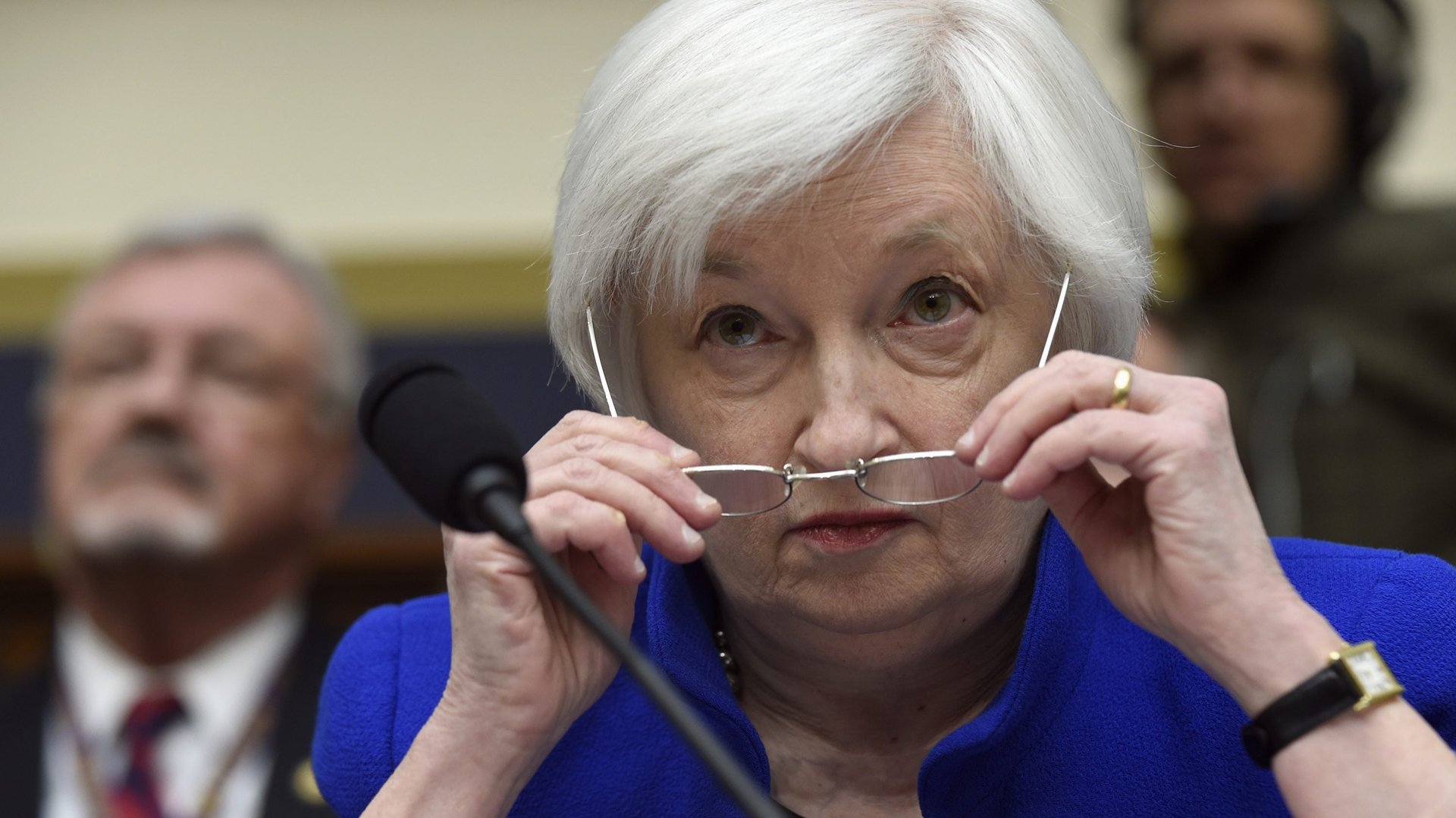Trump is ready to go to bat for big banks—but Yellen still has an ace up her sleeve
There are big changes ahead at the Federal Reserve. US president Donald Trump is said to be close to announcing candidates for two of the three open slots on the central bank’s powerful board of governors. By early next year, he could name a replacement for Janet Yellen as the Fed’s chair.


There are big changes ahead at the Federal Reserve. US president Donald Trump is said to be close to announcing candidates for two of the three open slots on the central bank’s powerful board of governors. By early next year, he could name a replacement for Janet Yellen as the Fed’s chair.
But the White House won’t be able to tap the successor to one of the agency’s most influential positions, its general counsel. That decision rests instead with Yellen and her colleagues, giving them crucial sway over the direction of the central bank—and its efforts to police big banks—for potentially many years to come.
Scott Alvarez, who guided the Fed through the financial crisis and the writing of Dodd-Frank, said in February that he will retire this year, after more than three decades at the agency. The central bank has yet to announce a successor. Brandon Barford, a partner at Beacon Policy Advisors, says hiring someone who can play an active role in policymaking should be a top-tier priority for Yellen.
“Getting the right person in there will help frame the debate about how the Fed responds to internal and external pressures—with the right type of hire, the boundaries of those discussions will be set in large part by the general counsel,” he says.
And the earlier a new general counsel takes over, the more time he or she will have to acclimate to the role before Trump nominees begin taking their seats at the table. Those watching the Fed have expressed surprise that the recruiting process has already dragged on for this long.
It’s possible that a Fed board led by Trump appointees could move to fire whoever Yellen names—a factor that could be limiting the candidate pool—though observers say the move would be unusual and potentially disruptive for the agency.
The central bank’s chief lawyer will have be selected carefully, to be sure. The role is best suited for a legal technician, someone who has a detailed understanding of the complexities of the bank regulatory structure—it’s not a job for ideologues. But that’s not to say the general counsel doesn’t have a key hand in policy.
Peter Conti-Brown, an assistant professor at the University of Pennsylvania’s Wharton School, argued in a February op-ed that the central bank’s general counsel has the power to “direct trillions of dollars and the bank’s extraordinary power.”
“This was true before the financial crisis, as Fed lawyers whittled away the statutory constraints that Congress had placed on financial firms. It was true during the crisis, as Fed lawyers organized the response. And it has been especially true after the crisis, as Fed lawyers designed the new financial regulatory framework,” he wrote.
Whoever takes over for Alvarez will have the opportunity to leave a long-lasting mark on the central bank at a great time of change. The new general counsel will not necessarily be able to halt efforts by Trump appointees to loosen or unwind the rules governing the country’s biggest banks, but he or she will help set the tone for those discussions and establish limits on the agency’s power under the law. The chief lawyer might even outlast the current president altogether. Both Alvarez and his predecessor, Virgil Mattingly, served in the position for well over a decade each, over the span of several administrations.
The new top attorney will also take on an important public-facing role, managing much of the Fed’s outreach with Congress. House Republicans passed a bill last week that included a host of proposals designed to sideline the central bank—measures to roll back some of its powers to oversee the country’s largest financial institutions and to limit its independence in handling monetary policy.
“The general counsel has historically played a significant role in the Fed’s relationship with Congress,” says Oliver Ireland, a partner at law firm Morrison Foerster. “I think they’re going to be a player at the staff level on the independence issue and also on whatever happens in terms of deregulation.”
Republicans and Democrats alike will be watching the position closely. Conservatives have long been critical of the Fed’s expansive powers, including the extraordinary measures the central bank took during the financial crisis and the new responsibilities it gained under the Dodd-Frank Act. Under the law the Fed won greater authority to oversee both big banks and non-bank financial firms designated as “systemically important.
Critics on the left, including Sen. Elizabeth Warren, have repeatedly blasted Alvarez for being too bank-friendly. They charge that he played a key role in the undoing of Dodd-Frank’s so-called “swaps pushout” provision, which required banks to move risky derivatives out of their depository institutions. Congress reversed the measure in late 2014.
In reality, stopping efforts to unwind bank rules will be outside of the control of any one official. But those worried about the impending rollback, including Yellen and her Obama-era colleagues, should use all of the tools available to them to limit those efforts before their window closes.